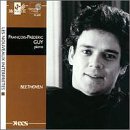| All Artists: Ludwig van Beethoven, François-Frederic Guy Title: Beethoven: Piano Sonatas Nos. 29 & 30 Members Wishing: 0 Total Copies: 0 Label: Harmonia Mundi Fr. Release Date: 4/14/1998 Album Type: Import Genre: Classical Styles: Chamber Music, Forms & Genres, Sonatas, Historical Periods, Classical (c.1770-1830), Romantic (c.1820-1910) Number of Discs: 1 SwapaCD Credits: 1 UPC: 794881417926 |
Search - Ludwig van Beethoven, François-Frederic Guy :: Beethoven: Piano Sonatas Nos. 29 & 30
 | Ludwig van Beethoven, François-Frederic Guy Beethoven: Piano Sonatas Nos. 29 & 30 Genre: Classical
|
Larger Image |
CD Details |
CD ReviewsEverest Peter Charleton | Dublin 6, Ireland. | 03/17/2000 (5 out of 5 stars) "This recording was met by the highest possible critical acclaim when it was released in Europe.It is easy to see why.Beethoven's opus 106 has a huge last movement fuge subject,his longest slow movement,an extraordinary middle section to the scherzo that drifts through a spiritual moment of frozen time and a first movement that is the last example of the composer's heroic mode.For pianists it is the Everest of classical music,a sonata that takes the forms of Hadyn and Mozart to the limit of their capacity to order thought.This work is not popular in the concert hall.There are perhaps two reasons:pianists are terrified of the ultimate demands it makes on memory,technique and stamina;audiences need spiritual preparation to enter the world of striving beyond despair that is the essence of the composer's message to us.So, it is not a work that speaks to the masses.It does speak to the individual.In quietly hearing the piece again and again at home,concentrated study pays off.It is the gateway that opens up the world of the last quartets. To play this piece a pianist must have wisdom, a massive technique,an extraordinary stamina,high intelect,a melodic line and a quality sound.Guy was only twenty eight when he recorded this.He dares to take Beethoven's very fast metronome markings literally,and yet in the slow movement nothing is missing of worldly experience or the probing thoughts that might begin to explain the sadness of one man or what might lie beyond it.His command of sound and of line is awesome in the entire sonata.Can it be explained how this young Frenchman could conquer the ultimate challenge in piano literature?Francois Frederic Guy is a phenomenon and his playing is a force of nature.The other sonata on the CD is more easy to get to know and has qualities of warmth and fantasy that make it a good foil for the Hammerclavier." Excellent Surprise! Milan Simich | 10/23/2005 (5 out of 5 stars) "Having heard many Hammerklavier's over the years, both on record and in person, a Rudolf Serkin many years ago at Carnegie Hall on Beethoven's Birthday comes to mind as well as the tremendous one this year at Carnegie by Mitsuko Uchida, I can honestly say that I was very surprised by this release. This on of the best Hammerklavier's on record. In fact, only Christoph Eschenbach's do I rate higher. Like Eschenbach's which is totally different, dreamy, almost impressionistic, Guy's, which is fast, doesn't ever lag. Both he and Eschenbach almost conquer the fact that the sonata is really too long. (I also think with the overtones that the modern piano produces and with the incompability with the piano forte, listen to the Badura-Skoda version, this piece should be played on an upright piano, a sort of happy medium. It does get a little wearing on the Hamburg Steinway!)
Like all great works of Art, the Hammerklavier cannot be encompassed by any one pianist, and there is certainly no such thing as a 'definitive' perfomance, so enjoy this one. In fact enjoy them all. Even Richter's 'bombs away' approach, (I swear he must have been deaf!) can be enjoyable. " |

 Track Listings (7) - Disc #1
Track Listings (7) - Disc #1